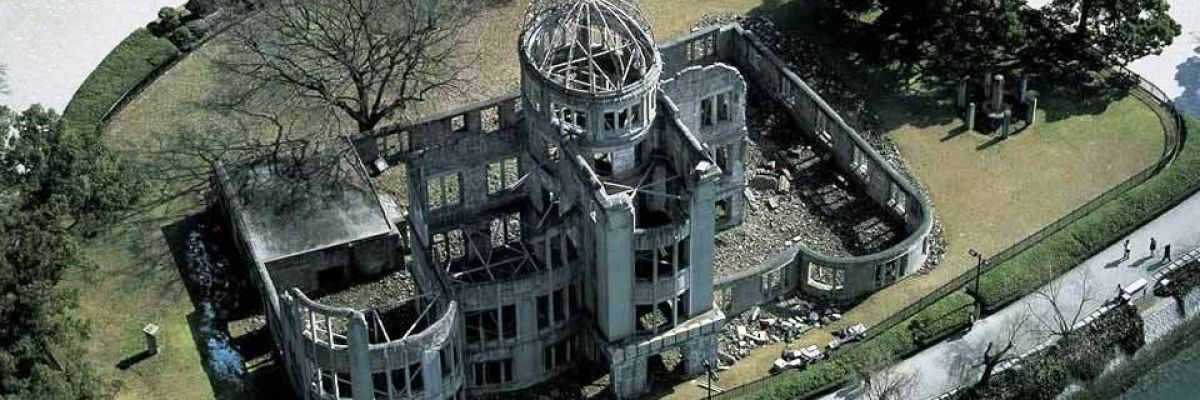
As the last weeks of July become the first weeks of August, print and digital media are filled with articles, letters, and comments about the 1945 atomic bombings.
Year after year, the middle of summer is given over to reiterating the same arguments, often made by the same people and in the same words.
Year after year, I shake my head at what is written and wonder why it is that no progress seems to be made in the discussion. So many people talk past one another. Very few even advert to moral questions. It’s frustrating.
For some time I’ve wondered what a proper approach might be. What is the best way to frame an analysis of those events of seventy years ago? How does one look at them from a Catholic point of view? How does one apply Catholic moral and ethical principles?
Before anything else, I think we have to perceive that much of what people say when writing about the atomic bombings has little basis in fact. They think they have nuggets of information that lead to this conclusion or to that conclusion, but much of what they “know” just isn’t so. Two examples:
Many people think there were substantive peace discussions going on through the Vatican or through Moscow. There weren’t.
Many people think that American casualties in an invasion of Japan were estimated officially at one million. They weren’t. (That number was first used in a 1947 article by former Secretary of War Henry Stimson in response to growing criticism of the bombings.)
Much of the heat generated in discussions, whether in print or online, is based on misinformation or wishful thinking. We have to begin with acknowledging this problem, and we can’t not deal with these things, however tedious that might be.
Let me make a parallel.
When I started writing my first book, I already knew a lot about the underlying issues. I had been dealing with Fundamentalists for the better part of a decade. I knew that Catholicism and Fundamentalism had to be structured in a certain way.
My goal was to leave Fundamentalists thinking that the Catholic Church might be their true home here below. How could I hope even to start them down that path? Only by approaching them on their own terms.
I could have written an explication of the Catholic faith: “Here’s what we believe.” I could have quoted creeds and catechisms and council documents. I could have given long passages from popes. I could have reprinted pages from the Summa Theologiae. But none of that would have done much good.
I hoped to reach two sorts of people. I knew Catholics would be my chief market, but I didn’t want to write just for them. I wanted what I said to enter the minds of Fundamentalists, whether directly from their reading my book (something that quite a few of them did, in fact) or indirectly from the arguments carried to them by my Catholic readers.
If I wanted Fundamentalists to see, and Catholics to use, convincing arguments, I had to present arguments that would convince Fundamentalists. I had to rely on authorities that they would trust, not on authorities that they would spurn.
That’s why Catholicism and Fundamentalism quotes from no papal decrees or conciliar documents. I didn’t make use of Thomistic syllogisms. I didn’t say, “Such-and-so must be true because all these great Catholics saints believed it.”
No, I used just three “authorities,” ones that Fundamentalists (or at least a good chunk of them) could acknowledge as worth paying attention to: Scripture, early Christian history, and common sense. A reader wouldn’t find himself having to concur with any distinctively Catholic authority. He could walk himself through my arguments, which were in terms he was familiar with.
The book was designed mainly as a corrective: “This thing and that thing and those things are wrong or untrue. What you, the Fundamentalist reader, thinks concerning the Catholic faith is, for the most part, wrong. You’ve been sold a bill of goods.”
I asked the Fundamentalist to look with different spectacles at those Catholic doctrines and practices he found off-putting. My goal was to show him that his anti-Catholic baggage was a burden he needn’t carry.
I had to take seriously the charges leveled by professional anti-Catholics and by those countless folks in the pews who believed the professional anti-Catholics. There were dozens of such charges. They had to be worked through one by one.
I can’t say that I dealt with every charge leveled against the Church—I didn’t—but I think I dealt with the chief ones. At least I don’t remember any Fundamentalist ever saying to me, “You missed the biggest issues of all!”
That, in rough, was how I organized Catholicism and Fundamentalism. What does this suggest about dealing with the atomic bombings?
I don’t think it would be sufficient to head straight to the question of morality: “Yes or no—was the use of the bombs moral?” I suspect that any answer anyone might come up with would go, in the case of most heads, in one ear and out the other. A too-quickly-drawn conclusion about morality would be lost in a welter of “but what about this fact (or factoid)?”
My sense is that a long essay or a book about the issue would need to come at it somewhat as I did in Catholicism and Fundamentalism.
The first part—and perhaps nearly the entire thing—would need to take up, serially, the many arguments (some large, some small) that commonly are used by people on either side of the question.
These were historical events, so the arguments chiefly are on historical points. There are dozens of historical points that need to be examined before a writer could hope to draw most readers’ attention to the moral considerations.
What would be the structure of the thing? What should be looked at, and what should be left for another time? How should this piece of writing accommodate the high emotions of most people who write about the bombings?
I invite your thoughts in the comments, but please note:
I don’t want any discussion whatsoever of the historical or moral issues themselves (such as: how many casualties were expected in an invasion; who properly counted as a combatant; were the atomic bombings moral or immoral?). That’s for another time and maybe another place. If you post such a comment, I’ll delete it.
What I’m looking for are suggestions about the rhetorical structure of an essay or book concerning these historical events.
Rhetoric is the art of persuasion. Aristotle wrote a book about its theory. So have many others, such as one of my favorite modern writers, Richard Weaver. Rhetoric concerns itself with trying to convince others about something or with trying to move them to take a particular action.
There already may be a book about the morality of the bombings from a Catholic perspective. If so, I haven’t come across it. (The closest one I know of is Msgr. Ronald Knox’s God and the Atom, written in 1945.)
If a book of that sort were to be outlined now, what would its parts be? What chapters would it have? How much emphasis should be given this point versus that point? How much emphasis should be put on the squabbles that occupy so many print and digital inches each summer? What things need to be addressed before turning to a resolution of the moral issues?
The only thing I’m pretty sure of is that such a book—or long essay, if that is the better format—needs to deal with people and their opinions as they actually are manifested in those articles, letters, and comments. I say that because, if I were to write such a piece, my target audience would be precisely the everyday folks who, year after year, offer their opinions.
I would want to respond to the comments that they have been serving up. Some of those comments are well-formed and well-informed; they come from people who, whatever their conclusions, have done some homework.
Unfortunately, most of the comments (especially those online) are the result of hearsay or misinformation or gut feelings, much like the attitudes most Fundamentalists have about the Catholic Church. Despite their provenance, those comments need to be answered, not ignored.
If you have a suggestion about how to structure such a piece of writing, add a comment below.
But please: pay attention to the limitation I’ve imposed. I don’t want to be heavy-handed on the Delete Comment button, but I will be, if I have to.
A last point: I have no present plan for such an essay or book, and maybe I’ll never get around to writing it, but I’m interested in your input because I think the exercise of outlining or planning such a project is valuable in itself.



